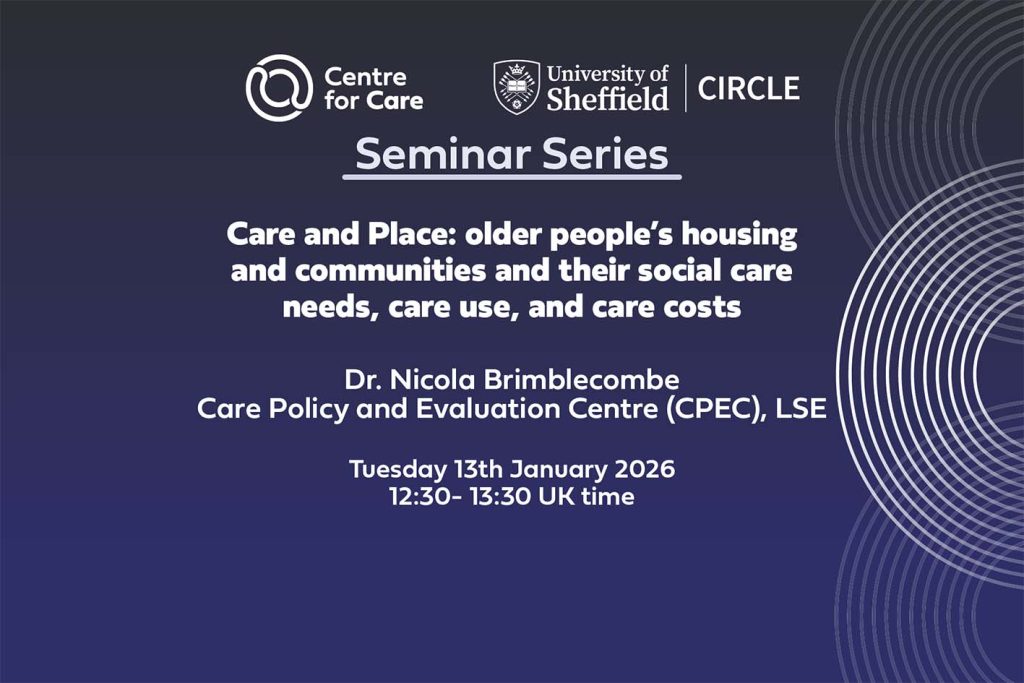Over the past few months we have submitted evidence to a number of wide-ranging inquiries and consultations relevant to care:
- Catherine Needham, Emily Burn and Centre for Care Associate Patrick Hall shared their expertise with the Scottish Parliament’s Health, Social Care and Sport Committee as part of its post-legislative scrutiny of the Social Care (Self-directed Support) (Scotland) Act 2013. Their written response explored the tensions between the Scottish policy of free personal care and self-directed support (SDS). They also discussed some of the barriers people face to accessing the full range of SDS options, which underlie its disappointing implementation.
- The House of Commons Public Accounts Committee called for evidence as part of its scrutiny of the Department for Health and Social Care’s (DHSC) implementation of planned reforms to adult social care. Catherine Needham and Emily Burn shared their analysis on the DHSC’s lack of understanding of the policy mix within social care, and the interdependencies of reforms – drawing on their recent book Social Care in the UK’s Four Nations.
- Maria-Teresa Ferazzoli (IMPACT), In Control Scotland, Radical Visions, Y.O.U. all contributed to the Scottish Government’s consultation on the proposed Learning Disabilities, Autism and Neurodivergence Bill. Their response combined the academic evidence and insights from both people with lived experience and practitioners working in the field. It explored training for professionals, inclusive communication, social care, housing, and the urgent need to ensure that people can access good quality care and support in the community, so that they don’t get stuck in long stay hospitals.
- Chloe Alexander shared her expertise from her PhD with the APPG on Young Carers and Young Adult Carers, in response to their call for evidence on ‘The Children and Families Act 2014 and the Care Act 2014 – 10 years on.’ Chloe submitted written evidence, and was invited to present to the APPG.
Chloe highlighted that the proportion of young carers who self-identify as such is still relatively low, many struggle to access support, and often describe experiencing stigma and stress when they do. Read more in this Briefing document.
- Kate Hamblin, Grace Whitfield and Centre for Care Associates Efpraxia Zaman, Anastasia Rousaki, Sharon Wagg, and Laura Sbaffi all contributed to a UK Parliament POSTnote on Digital disengagement and impacts on exclusion. These POSTnotes are intended to ensure that the best available research evidence on emerging topics is available to Parliamentarians in an accessible way.
- Catherine Needham and Emily Burn shared their expertise in response to the Scottish Parliament’s Stage 2 scrutiny of the National Care Service (NCS) Bill. This drew on findings from a collaborative project with the Local Government Information Unit (LGiU), which emphasised the importance of local areas being able to develop services and support which respond to their community’s needs. It also explored local government’s perceptions of the proposed reforms; sustainable funding of existing bodies was seen as more important than structural reconfiguration to ensure better outcomes for people drawing on care.
- We responded to the Northern Irish government’s consultation on The ‘Good Jobs’ Employment Rights Bill. Kate Hamblin shared learning from the international evidence on paid carer’s leave, while Duncan Fisher and Liam Foster shared emerging findings from their fieldwork exploring trade union organising in the care sector.
- We were delighted that the newly appointed House of Commons Health and Social Care Committee prioritised adult social care as the focus of its first inquiry, ‘Adult social care reform: the costs of inaction’. We submitted written evidence,which explored how the current system fails both people who draw on care and support and unpaid carers, as well as the increasing pressures faced by community organisations and the wider ecosystem of care.
Maria Petrillo was invited to present the ‘Costs of caring’ paper to the Committee in March. The report highlights that “unpaid carers are bearing the highest cost from successive governments’ failures to reform adult social care”. Our research has demonstrated the income penalty carers experience and the barrier young carers face, which contribute to a sense that they are an undervalued but integral part of the fabric of social care in the UK, providing care that is annually valued at £184bn.
- We submitted evidence to the House of Commons Business and Trade Select Committee’s inquiry scrutinising the Government’s flagship Employment Rights Bill. Our response highlighted the case for introducing paid carer’s leave as an amendment to this Bill; we have also produced a short evidence briefing on this. International evidence shows that a right to paid carer’s leave could help carers to stay in work if they want to. Unpaid leave risks exacerbating existing inequalities, particularly for women, younger carers, and those on low incomes or in precarious work.
We also explored the implications of the Bill for the social care workforce – including what the range of new employment rights would mean for care workers and their employers, and the proposed new collective bargaining arrangements (Fair Pay Agreements).
- We responded to the consultation on the NHS 10 Year Plan, arguing that social care needs to play an important role in the ‘three shifts’ proposed in the plan:
- The shift from analogue to digital – planning for the digital switchover in the care sector, tackling digital exclusion among the public and the workforce, and establishing which technologies are useful in improving care will be essential. The claim that technology is more efficient needs interrogating; often additional human labour is required.
- The shift from care in hospitals to care in the community – tackling the social care workforce crisis, and promoting more joined-up working between services, will be essential to this vision.
- The shift from a system which treats ill health to one which is preventative – chronic underfunding of adult social care is a key barrier to achieving this goal, as well as a lack of a shared understanding of what we mean by ‘prevention’.
- In February 2025, Kate Hamblin and Grace Whitfield submitted evidence to the House of Commons Public Accounts Committee inquiry on the Government’s relationship with digital technology suppliers. Our response highlighted ethical and practical issues in the procurement of digital technologies for use in the social care sector, which is fragmented and often poorly understood.
About the author
Becky joined the Centre for Care in June 2022 as a Research Associate, working closely with Professor Sue Yeandle. Her role is to ensure that our research makes a difference to care policy, using our evidence to respond to parliamentary inquiries and government consultations across the four nations of the UK. This will include working closely with the team to gather evidence on critical and emerging issues in care, as well as synthesising the grey and academic literature and engaging with our partners in the care sector.
More updates

We are delighted to virtually welcome Professor Jennifer M. Piscopo, from the Royal Holloway University of London, to present ‘Care as a Public Good and a Human Right: Latin America’s Transformative Care Agenda’ on Tuesday 17th February 2026
Read More about Seminar: Care as a Public Good and a Human Right: Latin America’s Transformative Care Agenda
Robert Walker and PJ Annand explore how lived experience in care research is valued and recognised, and why this has led to a change in the Centre for Care’s payment policy.
Read More about Why we updated our co-production payment rates (and what it means): a shared reflection
Seminar recording now available! We welcomed Professor Jerry Tew and Dr. Philip Kinghorn from the University of Birmingham, to present ‘Family and Group Conferencing for Adults – what it can offer for informal carers’ on Tuesday 27th January 2026.
Read More about Seminar: Family and Group Conferencing for Adults – what it can offer for informal carers
Seminar recording now available! We welcomed Dr. Nicola Brimblecombe to present ‘Care and Place: older people’s housing and communities and their social care needs, care use, and care costs’ on Tuesday 13th January 2026.
Read More about Seminar: Care and Place: older people’s housing and communities and their social care needs, care use, and care costs

